
Engaging Minds in Biological Science Education
Innovative Pedagogies, Curriculum Design, and Strategies for Student Engagement
Included:
✓ 200+ Page AI-Generated Book
✓ ePub eBook File — read on Kindle & Apple Books
✓ PDF Print File (Easy Printing)
✓ Word DOCX File (Easy Editing)
✓ Hi-Res Print-Ready Book Cover (No Logo Watermark)
✓ Full Commercial Use Rights — keep 100% of royalties
✓ Publish under your own Author Name
✓ Sell on Amazon KDP, IngramSpark, Lulu, Blurb & Gumroad to millions of readers worldwide
Transforming Education in Biological Sciences
In a world where biology continually evolves, so must our methods of teaching it. "Engaging Minds in Biological Science Education" presents a comprehensive exploration of contemporary pedagogical approaches tailored for the biological sciences. This book dives deep into the strategies that are reshaping the educational landscape, focusing on active, student-centered methodologies that inspire and enlighten.
Active and Student-Centered Learning
At the core of modern pedagogy is the shift toward student engagement. Readers will discover how employing visual and interactive tools—such as graphic organizers, 3D animations, and virtual labs—can demystify complex biological processes like photosynthesis and organ systems. These resources play a crucial role in making learning both accessible and enjoyable, ensuring that students are not just passive recipients of information but instead, active participants in their education.
Project-Based and Collaborative Approaches
A pivotal theme explored in this book is the significance of project-based and collaborative learning. Delve into how these methodologies foster critical thinking, enhance communication skills, and encourage peer interaction. Supported by technology and simulation exercises, these strategies empower students to connect biology to real-world scenarios, making the subject matter relatable and significant.
Equity and Diversity in Curriculum Development
"Engaging Minds" emphasizes the necessity of inclusivity within educational settings. Discover how the integration of equity and diversity principles in curriculum design not only benefits all students but also prepares future educators through comprehensive training in facilitating inclusive classrooms. The book provides insight into methods for connecting biological concepts with various career paths, particularly for non-major biology students.
Diversifying Instructional Strategies
The author addresses the critical need to move away from traditional, lecture-dominated paradigms—focusing instead on varied instructional strategies that cater to diverse learning styles. Techniques including case-based learning and storytelling are examined for their effectiveness in enhancing retention and making lessons relevant, ultimately enriching students’ understanding and interest.
Enhancing Teaching Effectiveness
Formal training programs for undergraduate teaching assistants are also highlighted, emphasizing essential topics such as mindset, questioning strategies, metacognition, and the science of learning. These components are integral to elevating teaching effectiveness and ensuring that educators are well-equipped to guide students through the complexities of biological education.
This book is a must-read for educators, curriculum developers, and students interested in making a lasting impact in the field of biological sciences. With meticulously researched insights and innovative practices, readers will be inspired to embrace the future of education in their classrooms!
Table of Contents
1. Redefining Biological Science Education- Introduction to Current Pedagogical Trends
- The Impact of Technology on Learning
- Engaging Students Through Active Learning
2. Visual and Interactive Tools
- Utilizing 3D Animations for Clarity
- Implementing Virtual Labs Effectively
- Graphic Organizers as Learning Aids
3. Project-Based Learning in the Sciences
- Designing Effective Projects
- Collaboration Techniques for Success
- Measuring Student Engagement in Projects
4. Creating Inclusive Classrooms
- Principles of Equity in Education
- Training Educators for Inclusivity
- Connecting Science to Diverse Contexts
5. Diverse Learning Strategies
- Understanding Learning Styles
- Incorporating Case-Based Learning
- Using Storytelling to Enhance Retention
6. The Future of Biological Curricula
- Emerging Trends in Curriculum Development
- Integrating Real-World Applications
- Feedback from Students and Educators
7. Training for Teaching Assistants
- Essentials of Teaching Mindset
- Questioning Strategies for Engagement
- Metacognition and Its Role in Education
8. Evaluating Teaching Effectiveness
- Metrics for Success in Teaching
- Peer Review and Feedback Mechanisms
- Continuous Professional Development
9. Building Community in Science Education
- Creating Collaborative Learning Environments
- Engaging Parents and Communities
- Networking Among Educators
10. The Role of Simulations in Learning
- Simulations as Learning Tools
- Designing Effective Simulated Environments
- Assessing Learning through Simulation
11. Student-Centered Assessment Techniques
- Innovative Assessment Strategies
- Feedback and Self-Assessment Methods
- Aligning Assessments with Learning Goals
12. Looking Ahead: The Evolution of Teaching Biology
- Future Innovations in Pedagogy
- Preparing Students for Biological Careers
- Embracing Change in Education
Target Audience
This book is aimed at educators, curriculum developers, and students interested in effective teaching methods and strategies in biological sciences.
Key Takeaways
- Understand student-centered active learning methodologies in biological sciences.
- Learn how to apply visual and interactive tools to enhance engagement and understanding.
- Explore strategies for project-based learning that foster collaboration and critical thinking.
- Discover the importance of inclusivity and diversity in curriculum development.
- Identify effective assessment techniques that align with learning goals.
